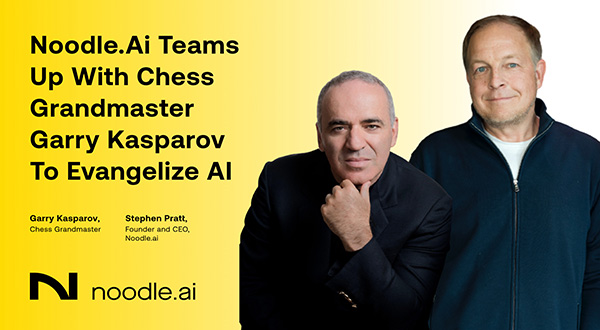Human + Machine Intelligence Improves Supply Chain
A chess grandmaster embraces the AI that threatened him, says it a powerful tool for humans to enhance everything, including supply chains. By Stephen Pratt, Founder & CEO, Noodle.ai
The supply chain crunch that started with COVID-19 is now expected to continue into next year given complications from the rising Delta variant,booming consumer demand for goods and shortages of everything from raw materials to warehouse labor to shipping containers.
IHS Markit predicts supply chain disruptions well into 2022 with pessimists targeting 2023. All of this leads to longer waits for products, higher prices and, potentially, more waste if rapid market changes cause manufacturers to miss the mark on what goods are needed where and when.
But challenge always comes with opportunity and the world’s manufacturers—and those that move those goods —are stepping up investment in advanced technologies to increase supply chain efficiency.

No technology has more potential to positively impact supply chains than artificial intelligence. Taken one step further, I’m talking about the term coined by famed chess grandmaster Garry Kasparov, “augmented intelligence,” which is when the creativity of humans and the brute strength of machines combine for a better result than one or the other could accomplish alone.
Kasparov isn’t alone in believing that the human + machine combination is the winning one. By 2030, market researcher Gartner expects “decision support/augmentation” — which also describes augmented intelligence — to surpass other types of AI initiatives and account for 44% of the global AI-derived business value.
Indeed, augmented intelligence is steadily making inroads into many industries. Here’s three ways augmented intelligence is improving, and will continue to improve, manufacturing and supply chain execution:
Prioritize and Predict. Kasparov was one of the first humans to have his job security threatened by AI when he lost a chess match to the supercomputer, Deep Blue, in 1997. Newsweek noted the match with the headline, “The Brain’s Last Stand.” Since then, Kasparov has dedicated his life to the positive applications of AI—with the twist that humans and AI enhance each other’s strengths.
Kasparov believes, and I agree, that computers and AI will free humans from menial cognition, giving us the time and energy to focus on what really matters. In the world of manufacturing and supply chains, AI can analyze mountains of data super fast, which humans cannot do, while humans will excel at setting priorities because, as Kasparov says, we “know what matters most, what really counts,” in a way that machines never will.
For instance, when COVID-19 first hit, companies, factories and supply chains faced a massive change in conditions almost overnight. They had to prioritize what to keep doing and what to stop doing. Kellogg, for instance, pivoted quickly to simplify its portfolio to maximize the amount of food to ship and switched up how it shipped goods, noted George Chumakov, Kellogg’s senior vice president supply chain in a recent fireside chat, “Creating Perfect Flow in Supply Chains.”
In times of rapidly changing conditions like a COVID-19 shutdown, the blind spots of a (human) planner can be especially damaging. Having to wrangle data manually takes too long. But with AI to crunch the data, planners have more information, faster, to make the right predictions. The human value is to make sure the AI asks the right questions of the data.
“Unless you know how to pose the right question, the answer AI comes back with is irrelevant,” Kasparov says. “AI will most likely never be perfect on its own, but humans actually give machines the power to create efficiencies from raw computing power.”
Inform and empower planners. It can take years for plant operators to master their craft. With AI as a tool, they get better, faster, Kellogg’s Chumakov said. AI is a tool, “whispering in the planner’s ear.” Kellogg has found that AI-derived advice is “right more often than not,” and that planner adoption picks up over time, he added. AI “augments” planner intelligence, agrees Jay Koganti, vice president supply chain for Estee Lauder.
Uncover problems, opportunities. Modern factories are filled with sensors that continuously kick out trillions of data points. AI engines calculate, in real time, how one factor impacts another and pinpoint what’s causing problems and where opportunities exist. Not even an experienced plant operator can analyze as much data as AI can, or identify hidden patterns as fast. If plant operators, armed with AI insights, know why equipment falters, for instance, they can preemptively act to prevent trouble.
No checkmate in this match
Ten years ago, computers weren’t fast enough to enable the augmented intelligence we see today. The human-machine partnership has only just begun and, rather than checkmate one or the other, this game will result in faster, more efficient supply chains that improve quality, deliver goods to consumers on time and reduce waste.

Stephen Pratt, Founder & CEO
Noodle.ai








